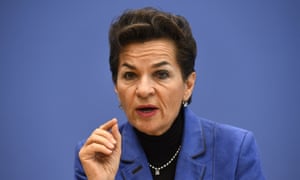Christiana Figueres takes swipe at Barack Obama, saying China ‘has taken an undisputed leadership’ in transforming economy to avoid further climate change

China is now leading the world when it comes to fighting climate change – handily beating the US’s efforts under Barack Obama to move to a clean energy economy, the United Nations climate chief said on Tuesday.
In a swipe at the US president, who has embraced the fight against climate change as his legacy, Christiana Figueres, the UN’s leading climate official, said that when it came to getting off fossil fuels America was still relegated to an also-ran.
“The United States is actually playing catch-up to China,” Figueres said.
China and the US between them account for more than 40% of the world’s carbon pollution. The two countries are critical to efforts to reach a deal to avoid catastrophic climate change at a meeting in Paris, now less than a month away.
But China was moving much more swiftly to transform its economy than the US or other countries, Figueres said.
“China has taken an undisputed leadership,” she told an event hosted by the Christian Science Monitor and the Nuclear Energy Institute, the industry lobby group.
Figueres refused to comment directly on the extent to which Obama’s efforts to fight climate change were hamstrung by industry or by a Republican-controlled Congress, which has threatened to overturn his climate change plan.
Republicans in Congress last week moved to block Obama’s plan to cut carbon pollution from power plants, the main pillar of his climate change plan.
Figueres’s comments took aim at a central Republican argument for their opposition: that China as the world’s biggest emitter is not doing enough to fight climate change, and that moving to clean energy will hurt the US economy.
With less than a month to go before nearly 200 countries gather in Paris to try to reach a climate deal, Figueres has been lobbying major economies to make bigger emissions cuts, and dig deeper into their pockets to help poor countries prepare for future climate change.
Advertisement
She said she was confident of reaching some kind of deal in Paris. The question was whether it would be enough to avoid the catastrophic consequences of sea-level rise, extreme weather, droughts and floods if warming goes unchecked.
In the run-up to the meeting, more than 150 countries have set their own goals for reining in or cutting their production of the greenhouse gases that cause climate change.
That could help avoid the worst-case scenario if the world did nothing, but the pledges so far still fell far short of the internationally agreed goal of limiting warming to 2 degrees Celsius.
Figueres conceded the gap but insisted that the shift in the global economy was “unstoppable”.
“I have full confidence we are going to get on this two-degree pathway,” she said. “The only question is speed.”
In the approach to Paris, the UN has been reaching out to business leaders to help make the case that fighting climate change would be good for the economy.
Figueres said that China had already seen competitive advantage in moving away from coal that is choking its cities towards solar and wind energy.
She argued that those changes had helped spur Obama to act more boldly on climate change in his second term. “That has politically opened up a lot of space in the United States,” she said.
“I think it is very very evident to everyone that in his second term President Obama has felt much more free, much more at liberty to begin to be much more specific about his vision of US leadership in this,” Figueres said.
“What is very interesting to me is to see how much this is in relation to seeing what is happening now – not actually at the same time but actually before the US – in China.”

